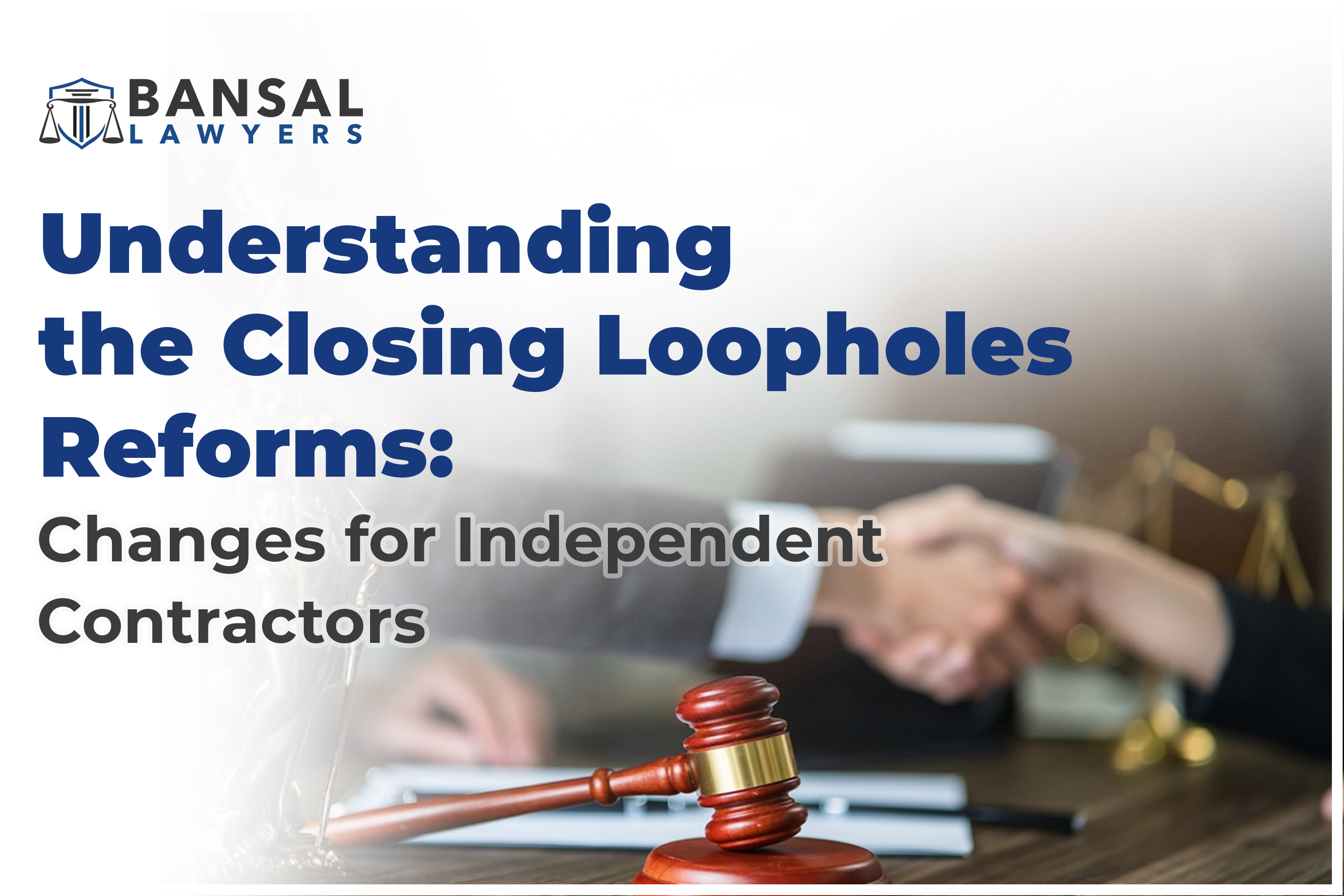Divorce Lawyers in Melbourne Australia – Complete Guide for Couple
Jan 31, 2026

As on August 2024, the Government of Australia made some changes in Act 2009 of Fair work to provide protection to independent contractors. As per the changes, it is a part of closing the wrong paths to be reforms, which help the employees not treated wrongly as independent contractors when they are employees.
These changes make clear to provide fair treatment for the independent contractors which brings them high protection and rights. Changes in fair work act 2009 are as per below how these changes will impact workers and business in Australia.
Earlier in Australia independent contractors were more freedom in their work but can’t get any benefit like superannuation or any job security against their unfair dismissal. A big change in Section 15 AA as closing loopholes no 2 in which it shows that it’s not just a contract that matters, which tighten the rules for find who will be an independent contractor or an employee at job.
After these changes in Law in Australia the working conditions will decide the person is an independent contractor or an employee. See the points below which mean that how the work is actually performed. For example:
This change ensures that workers who are essentially employees are not wrongly classified as independent contractors
2. High-Income Independent Contractors
Those independent contractors earn over $175,000 per year, they have an option to opt-out to consider as an employee. If their earnings more than the threshold, the employer and contractor both can eligible to opt out of the new employee protection.
3. Protections for Gig Economy Workers
Closing Loopholes create more protections for gig economy workers like delivery workers and ride share drivers by make them positive that they are not exploited. Gig economy pathway provides direct contracts with better protection for the workers including:
4. Road Transport Industry Changes
As per new rules independent contractors must have to provide fair wages and working conditions with protect against unfair practice.
5. Unfair Contract Terms
New Rules in which Independent Contractors have ability to challenge fowl play unfair terms in contracts. It’s also provided best security and fairness for those who are working in industries that depend on independent contracting.
Case Study: Amita Gupta and Uber Eats – A Landmark Decision
A landmark case that highlights the importance of the Closing Loopholes reforms is the decision involving Amita Gupta and Uber Eats. Ms. Gupta, a delivery driver for Uber Eats, challenged her classification as an independent contractor after being permanently blocked from the platform in January 2019. She argued that she was effectively an employee and sought an unfair dismissal remedy under the Fair Work Act 2009.
Background
Ms. Gupta worked as a delivery driver for Uber Eats, completing over 2,200 deliveries between 2017 and 2019. She used her own car and had the flexibility to log in and out of the Uber Eats app at her discretion. However, Uber Eats maintained significant control over her work through its ratings system, service standards, and the ability to deactivate her account for poor performance.
In 2019, Ms. Gupta was permanently blocked from the platform for failing to meet Uber Eats’ delivery standards. She filed an unfair dismissal claim, arguing that she was an employee of Portier Pacific Pty Ltd (Uber Eats’ Australian entity) and was entitled to protections under the Fair Work Act.
The Decision
The Fair Work Commission initially ruled that Ms. Gupta was not an employee, citing her flexibility and lack of obligation to accept work. However, on appeal, the Full Bench of the Fair Work Commission examined the true nature of the relationship. The key findings included:
The Full Bench concluded that Ms. Gupta was not an employee but acknowledged the complexity of the case and the broader implications for gig economy workers.
How the Reforms Would Apply
Under the Closing Loopholes reforms, cases like Ms. Gupta’s would likely have a different outcome. The reforms focus on the actual working relationship rather than the written contract, ensuring that workers who are effectively employees are not misclassified. For gig economy workers like Ms. Gupta, the reforms provide:
How These Changes Benefit Employers and Workers
For Employers:
For Workers:
Why These Changes Matter
These Closing Loopholes no 2 which make significant step forward to protect workers those Misclassified as independent contractors.
The Closing Loopholes No. 2 reforms are a significant step forward in protecting workers who have been misclassified as independent contractors. This is to reform a focus on how the people really work together it’s sure to those contractors in the gig economy will treat with fair in work and get better opportunities.
Cases like Amita Gupta’s highlight the importance of these changes in addressing the power imbalance between gig economy platforms and their workers. The reforms provide a clearer framework for determining employment status and ensure that workers receive the rights and protections they deserve.
If you’re an employer or independent contractor and need advice on how these changes affect you, contact Bansal Lawyers, provides Best Legal Services in Melbourne Australia today for expert guidance. Our team of best lawyers in Melbourne Australia gives proper guidance to help client for these legal changes with proper manner.
Last updated: Nov 11, 2025